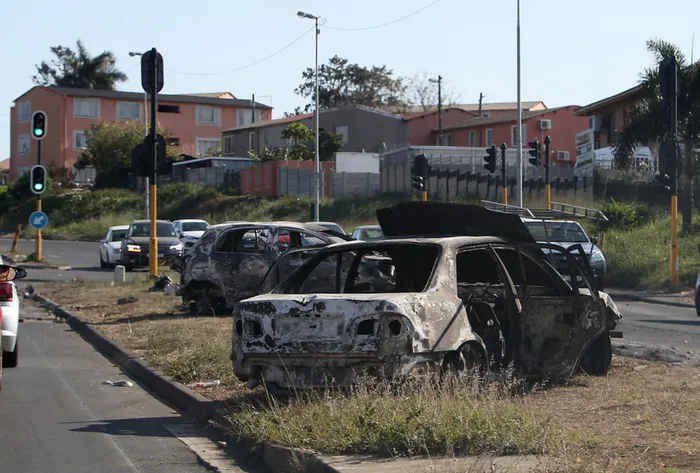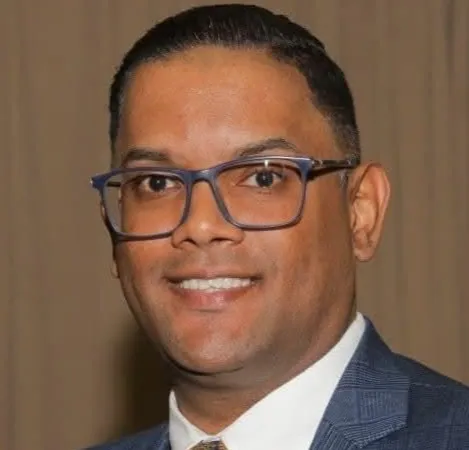Four years after the flames: the lingering scars of July 2021
Reflections

Motor vehicles were set alight on Phoenix Highway during the unrest in Phoenix, north of Durban. The writer says the community of Phoenix, where he serves, became the unfortunate epicenter of the storm.
Image: Motshwari Mofokeng/African News Agency (ANA)
JULY 2025 marked four years since one of South Africa’s darkest modern moments - the unprecedented unrest that swept across KwaZulu-Natal and parts of Gauteng, in the wake of former President Jacob Zuma’s incarceration.
What began ostensibly as protests against the arrest of a former head of state quickly devolved into a full-scale attempted insurrection, revealing the deeper, festering wounds of a society teetering on the edge of collapse.
While the political trigger was clear, it was merely a spark to a powder keg long in the making: mass unemployment, entrenched poverty, a failing state, and the devastating socio-economic fallout of the Covid-19 pandemic. It was not just a protest - it was a desperate cry from a people disillusioned with their government and abandoned by the promise of democracy.
Phoenix: a town at the crossroads of crisis
The community of Phoenix, where I proudly serve, became the unfortunate epicenter of the storm. When looters and violent instigators advanced toward homes, businesses, and places of worship, residents stood up. Men and women, young and old, took up the mantle of self-defence - not out of hate, but out of fear. They did what the state failed to do: they protected lives, livelihoods, and the very fabric of their communities.
But amid that defensive stance, a terrible tragedy unfolded. A few individuals - acting outside the bounds of law and without the mandate of any community - targeted people based not on behaviour, but on skin colour.
Innocent lives were lost. Families were shattered. Children were orphaned.
The names of Delani Hadebe, Mondli Majola, and others - black and Indian - echo as chilling reminders that hatred and racial profiling have no place in a democratic society.
Let us be clear: these individuals who committed racialised violence do not represent Phoenix. They do not represent the Indian community, nor any other community. Their actions tarnished a town that was, for the most part, standing for what was right. And even now, four years later, Phoenix still carries a stigma that it does not deserve - a burden placed on the shoulders of people who had nothing to do with those isolated acts of hatred.
The racial wedge: a wound reopened
The unrest deepened the racial divide, especially between black and Indian communities. Opportunists and unscrupulous individuals, some with political motives, exploited the violence to pit South Africans against one another. They used social media to inflame tensions and spread misinformation. It became easier to blame a race than to blame the real culprits - the masterminds, the failed state security apparatus, and the rotten political elite. But amid that darkness, there were lights of hope.
A statesman among us: the peacemaking of Prince Mangosuthu Buthelezi
Few leaders rose to the occasion in the way the late Prince Mangosuthu Buthelezi did. As former Prime Minister to the Zulu monarch and President Emeritus of the IFP, he carried moral authority across racial, ethnic, and political lines. In the days and weeks following the unrest, he made tireless efforts to calm tensions, traveling to communities on both sides of the divide, encouraging dialogue, compassion, and unity.
It was Prince Buthelezi who reminded us of our shared destiny, of the legacy of struggle that both Indians and black South Africans had jointly inherited from history. It was he who said: "We are not enemies - we are neighbors, friends, family."
His efforts brokered peace when government officials were nowhere to be seen. Today, more than ever, we miss his leadership - his voice of reason, his moral compass, his quiet but unwavering courage.
Security failures and political cowardice
Perhaps the most damning indictment of that period was the sheer failure of the state to anticipate, contain, or prevent the unrest. South Africa’s intelligence agencies failed to detect the planning. The Minister of Defence at the time flatly denied any signs of an insurrection, even as cities burned. The president's response was slow and unconvincing.
Worse still, the very architects of the chaos - the so-called "commanders" of the uprising, many of whom are now seated comfortably as Members of Parliament, some in the ANC and others in the MK Party - have evaded justice. The silence of law enforcement and the inaction of the prosecuting authority make a mockery of justice. It is a betrayal to the people who died, to the families who mourn, and to the country that still suffers.
Lingering aftershocks
Economically, thousands of small businesses never reopened. Jobs were lost, and informal traders were devastated. Socially, trauma still lives in the eyes of our elders, in the anxiety of our children, and in the conversations we whisper at dinner tables. Politically, the unrest laid bare the true fragility of our state and the recklessness of those in power.
Today, in 2025, there are rumblings once again. A statement by KwaZulu-Natal’s Police Commissioner has implicated Minister Senzo Mchunu and associates in conversations that could hint at fresh unrest. One can only hope this time, the government will act swiftly and decisively. We cannot afford another July 2021. The cost would be too great.
Honouring the heroes, mourning the fallen
We owe a great debt to the many brave South Africans who defended our communities - not with hatred, but with heart. People of all races formed human chains to protect shopping malls, food depots, and homes. They guarded one another, treated the wounded, comforted the grieving, and fed the hungry.
We remember those who died at the hands of criminals - not just as statistics, but as sons, daughters, mothers, and fathers. People like Mondli Majola, whose bravery was evident in his final moments. People like Delani Hadebe, who was in the wrong place at the wrong time. They are not forgotten. They never will be.
Looking ahead
As we reflect on the past four years, let us commit to truth, justice, and healing. Let us reject the politics of division and the lies of opportunists. Let us defend our democracy - not only from those who seek to destroy it with fire and bullets - but from those who poison it with silence, denial, and impunity.
South Africa is wounded, yes - but not broken. We have been betrayed, yes - but we are not without hope. If we are to rise from these ashes, we must do it together. In unity. In peace. And with courage.

Jonathan Annipen
Image: Supplied
Jonathan Annipen is an IFP Councillor in the eThekwini Municipality and serves as the Whip on the Finance Committee. He writes in his personal capacity.
** The views expressed do not necessarily reflect the views of IOL or Independent Media.
Related Topics: